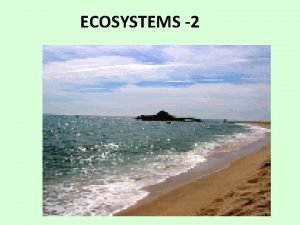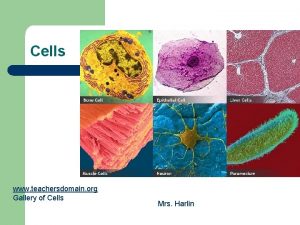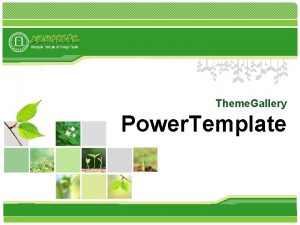Cells www teachersdomain org Gallery of Cells Ms














- Slides: 14

Cells www. teachersdomain. org Gallery of Cells Ms. Cuthrell

1. 1. 1 l Summarize the structure and function of organelles in eukaryotic cells (including the nucleus, plasma membrane, cell wall, mitochondria, vacuoles, chloroplasts, and ribosomes) and ways that these organelles interact with each other to perform the function of the cell.

Animal Cell

Plant Cell

NUCLEUS l l l Directs all cell activities Contains instructions for everything the cell does These instructions are found on a hereditary material called DNA

Plasma Membrane l l l Protective layer around ALL cells. Allows things in and out of cells. Helps cell maintain homeostasis (internal balance).

CELL WALL l l l protects the cell gives shape is made of cellulose A cell wall is found in plants, algae, fungi, & most bacteria. NOT found in animal cells. Located outside the cell membrane.

MITOCHONDRIA l l l Organelles that break down glucose to make ATP- process called cellular respiration. Since it makes energy, we also call it the powerhouse. Inner folded membranes= increase in surface area= more energy production during aerobic cellular respiration

VACUOLES l l l Temporary storage spaces Store food, water, waste Take up most of a plant’s cells volume.

Chloroplasts l l Green organelles that make food= photosynthesis found only in plant cells


RIBOSOMES l Site of protein synthesis! = to make proteins Float freely or attached to the endoplasmic reticulum (ER) l In ALL cells! l

The Cell is like a Factory l l DNA from the nucleus codes for proteins. Proteins are used as enzymes for chemical reactions: – – – Energy production at the mitochondria Making glucose in the chloroplast Digesting large organic molecules

Life’s Levels of Hierarchy l Atoms-> Molecules-> Organelles-> Cells >Tissues -> Organ Systems -> Organisms l This applies only for multicellular organisms. -
 Teachersdomain
Teachersdomain Www.themegallery.com
Www.themegallery.com Gallery walk rubric
Gallery walk rubric Task gallery
Task gallery Gallery deco
Gallery deco Gta v gallery
Gta v gallery Causes of the american revolution gallery walk
Causes of the american revolution gallery walk National gallery venue hire
National gallery venue hire Viriamu jones gallery
Viriamu jones gallery Gallery walk
Gallery walk Artame gallery
Artame gallery Sof gallery
Sof gallery Usa.gov apps gallery
Usa.gov apps gallery Gentry gallery v berkline
Gentry gallery v berkline Financial data visualization tools
Financial data visualization tools

























